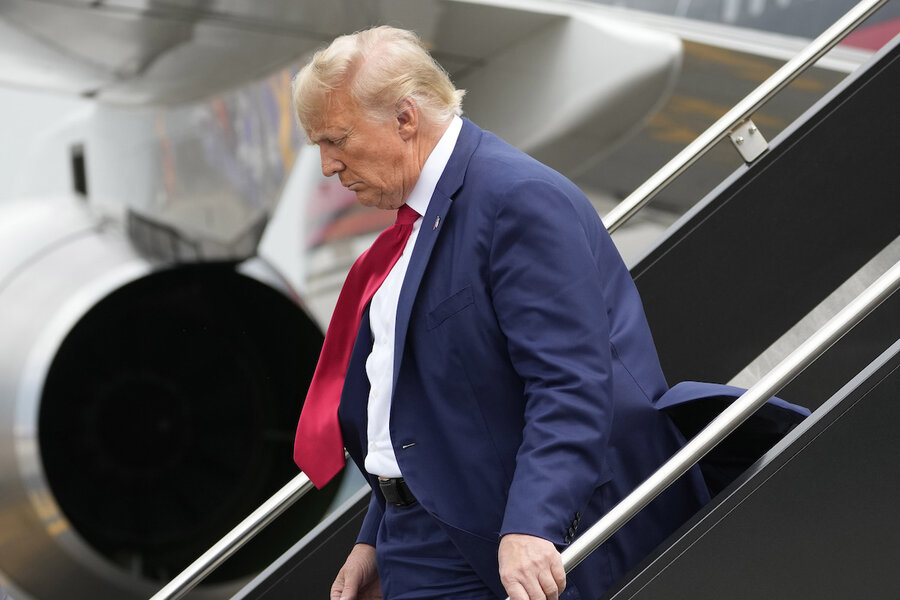Trump pleads not guilty to charges he tried to overturn 2020 election
Loading...
| Washington
Donald Trump pleaded not guilty Thursday to trying to overturn the results of his 2020 election loss, answering for the first time to federal charges that accuse him of orchestrating a brazen and ultimately unsuccessful attempt to block the peaceful transfer of presidential power.
Mr. Trump appeared before a magistrate judge in Washington’s federal courthouse two days after being indicted on four felony counts by Justice Department special counsel Jack Smith. In a criminal case seen as the most historically consequential of the three that he faces, the former president stands accused of trying to subvert the will of voters and obstruct the certification of Democrat Joe Biden’s victory before Jan. 6, 2021, when a mob of supporters stormed the U.S. Capitol in a violent clash with law enforcement.
Mr. Trump, the 2024 Republican presidential primary front-runner, sat stern-faced with his hands folded, shaking his head at times as he conferred with an attorney and occasionally glancing around the courtroom as his court appearance began. He stood up to enter his “not guilty” plea, answered perfunctory questions from the judge and thanked her at the conclusion of the arraignment.
His appearance Thursday unfolded in a downtown courthouse in clear view of the Capitol and in a building where more than 1,000 of the Capitol rioters have been charged.
The indictment charges Mr. Trump with four felony counts related to his efforts to undo his presidential election loss, including conspiracy to defraud the U.S. government and conspiracy to obstruct an official proceeding. The charges could lead to a yearslong prison sentence in the event of a conviction.
Special counsel Smith himself was in the courtroom and sat in the front row behind the prosecutors handling the case. Three police officers who defended the Capitol that day were also seen entering the courthouse.
Mr. Trump has said he is innocent, and his legal team has characterized the latest case as an attack on his right to free speech. Just minutes after the former president’s motorcade pulled away from the courthouse, his campaign was fundraising off the event. “My father was just officially arraigned,” read an email send under the name of his son, Eric Trump.
The case is part of an ongoing set of escalating legal troubles for the ex-president, coming nearly two months after Mr. Trump pleaded not guilty to dozens of federal felony counts accusing him of hoarding classified documents and thwarting government efforts to retrieve them.
The former president was the only person charged in this case, though prosecutors referenced six unnamed co-conspirators, mostly lawyers, they say he plotted with, including in a scheme to enlist fake electors in seven battleground states won by Joe Biden to submit false certificates to the federal government.
The indictment chronicles how Mr. Trump and his Republican allies, in what Mr. Smith described as an attack on a “bedrock function of the U.S. government,” repeatedly lied about the results in the two months after he lost the election and pressured his vice president, Mike Pence, and state election officials to take action to help him cling to power.
This is the third criminal case brought against Mr. Trump in less than six months.
He was charged in New York with falsifying business records in connection with a hush money payment to a porn actor during the 2016 presidential campaign. Mr. Smith’s office also has charged him with 40 felony counts in Florida, accusing him of illegally retaining classified documents at his Palm Beach estate, Mar-a-Lago, and refusing government demands to give them back. He has pleaded not guilty in both those cases, which are set for trial next year.
And prosecutors in Fulton County, Georgia, are expected in coming weeks to announce charging decisions in an investigation into efforts to subvert election results in that state.
Mr. Trump’s lawyer John Lauro has asserted in television interviews that his client's actions were protected by the First Amendment right to free speech and that he relied on the advice of lawyers. The former president has claimed without evidence that Mr. Smith’s team is trying to interfere with the 2024 presidential election.
This story was reported by The Associated Press. AP writers Lindsay Whitehurst, Ellen Knickmeyer, Ashraf Khalil, Rebecca Santana, Stephen Groves, Serkan Gurbuz, Rick Gentilo, Alex Brandon, Yihan Deng, Kara Brown, Nathan Posner and Alanna Durkin Richer contributed to this report.





